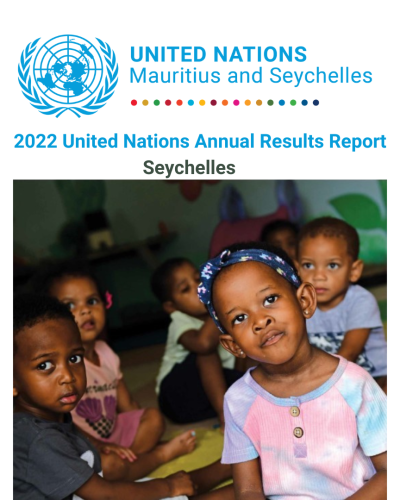2022 UN Country Annual Results Report Seychelles

The United Nations Country Team in Seychelles is pleased to present the Annual Results Report 2022. The report highlights key achievements of the United Nations team as envisaged through the joint United Nations – Government of Seychelles Strategic Partnership Framework (SPF) 2019-2023. The SPF is aligned to national priorities, the SAMOA pathway, Africa Agenda 2063, and the Sustainable Development Goals.
Seychelles continued its impressive recovery in 2022 with GDP growth at 5.8 per cent, overcoming obstacles arising in the aftermath of the COVID-19 pandemic and exacerbated by global commodity, food and energy shocks. The main drivers of recovery were the fisheries and tourism industries, with tourist arrivals reaching pre-pandemic levels. However due to its inherent structural vulnerabilities as a small island state, Seychelles needs to build resilience to climate change and transform the economy to achieve its development agenda. During the year, the United Nations Country Team continued supporting Seychelles in moving towards a green, climate-resilient, and more inclusive recovery.
Innovative green initiatives such as the Ridge to Reef project made considerable progress in the management and protection of key biodiversity areas. Fifteen hectares of coastal and mangrove ecosystems, along with an additional 52 hectares of forest around watersheds, were restored using nature-based solutions. In addition, coral reef restoration and rehabilitation activities resulted in improved ocean eco-system integrity, supporting climate adaptation and the livelihoods of coastal communities.
To maximize opportunities for digital transformation for a more resilient economy, a range of support was provided to the Government of Seychelles to encourage the uptake of digital tools, improve public service delivery, and facilitate effective partnerships with the private sector. In addition, the Blue Economy was enhanced with a new data-driven management system to promote biodiversity conservation and sustainable tourism at key heritage sites on the islands.
Across the United Nations’ interventions in the country emphasis was placed on gender equality and women’s empowerment. In addition, with a key focus on leaving no one behind United Nations agencies worked closely with national stakeholders to enhance equitable access to services. For example, health care was improved through a range of United Nations technical support, from building the capacity of health sector professionals to respond to health management demands to promoting best practices in sexual and reproductive health policies and services for women and young people. Meanwhile, advocacy and training were conducted to increase awareness of the rights of migrants, including access to social protection measures.
For small island states like Seychelles, regional collaboration and integration is a priority, given the limited access to financing due to its high-income status. The United Nations has facilitated regional collaboration between countries in the Indian Ocean in areas such as maritime security, labour mobility, migration, and climate adaptation and mitigation. In the spirit of UN reform and delivering as one, two joint programmes were launched with resources from the Joint SDG Fund on resilient food systems and the areas of Blue and Green economies.
The United Nations family places partnership at the heart of its work. I would like to take this opportunity to thank the Government of Seychelles for the continued confidence it places in the United Nations. We value the support of all our partners, including the Development Partners Group, multilateral development actors, regional cooperation bodies, international financial institutions, the private sector, civil society organizations, academia and others. I have no doubt that by continuing to engage in results-driven coordination we will make the transformative changes necessary to not only recover but also to become more resilient and accelerate towards achievement of the 2030 Agenda.
As the current SPF comes to an end, we appreciate the government’s commitment as it takes visible ownership and actively engages in the design of the new United Nations Sustainable Development Cooperation Framework, and we look forward to its successful implementation from 2024.
Ms. Lisa Simrique Singh
United Nations Resident Coordinator for Mauritius & Seychelles




















